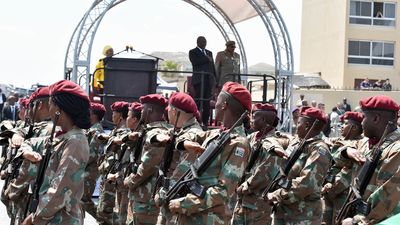The South African Military Wants to Fire One of Their Muslim Majors for Wearing a Hijab
Major Fatima Isaacs faces dismissal for wearing a hijab under her formal military beret.
Major Fatima Isaacs is a forensic pathologist who has served the South African National Defence Force (SANDF) for at least a decade at the 2 Military Hospital in Wynberg, Cape Town. After being given numerous warnings with regards to wearing her hijab while on duty, she has now been charged for allegedly disobeying a lawful command according to SANDF spokesperson, Mafi Mgobhozi.
Members of the Muslim Judicial Council (MJC) have shown their fierce support for Major Isaacs. The chairperson of the MJC, Mualima Khadija Patel-Allie, said that, "We live in democratic country, and we are finding ourselves in a position where one of our sisters is being denied a religious and democratic right. She added that, "This is of great importance to us, part of who we are and is a representation of what it means to be a Muslim woman. Our scarf is integral to our code of living."
Yesterday, Major Isaacs appeared before the Court of Military Justice where her case was subsequently postponed to August. According to labor specialist Nazeema Mohamed, who is advising Major Isaacs on her case, SANDF is violating the country's Bill of Rights which speaks to an individual's right to freedom of religion, belief or opinion and prohibits any unfair discrimination on those grounds.
However, as maddening as this case is, it comes with its challenges. Back in 2006, a legal precedent was set when Fairouz Adams, a Muslim social worker at a prison in the Western Cape, was actually fired for wearing a hijab.
Major Isaacs has reasonably argued that her hijab does not conceal any military rankings or insignia. What's ridiculous, however, is the fact that she was previously granted permission to wear her hijab by a number of senior officers. It's reported that a single colonel who has issue with her hijab, has now taken the matter to court.
Understandably, this case is incredibly important as it shows just how deeply entrenched Islamophobia is in various parts of society and the work we still need to do to root it out.
